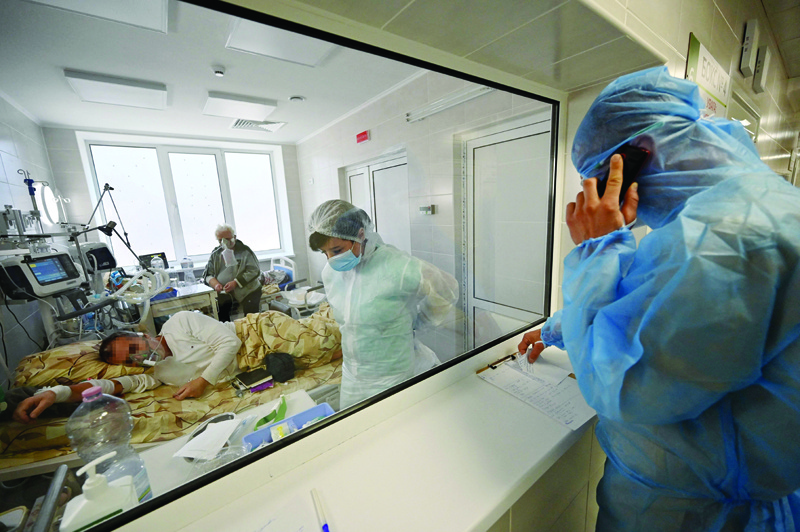 KIEV: A medical personnel provides medical assistance to a COVID-19 patient inside the intensive care unit in a hospital which treats patients with COVID-19 coronavirus in Kiev. - AFP
KIEV: A medical personnel provides medical assistance to a COVID-19 patient inside the intensive care unit in a hospital which treats patients with COVID-19 coronavirus in Kiev. - AFPKIEV: A young woman sobs and comforts her mother on a bench in a courtyard at Kiev's Hospital Number Four. "Daddy died this morning," she says through her tears - a scene becoming more and more frequent as Ukraine suffers through a devastating COVID-19 wave spurred by distrust of vaccines. In the hospital's morgue, rows of bodies in black plastic bags testify to the deadly surge in infections.
"Five of our patients have died since yesterday," hospital director Tetiana Mostepan, whose 455 COVID beds are 70 percent full, tells AFP. Among those hospitalized, "only three to four percent" were vaccinated, she says. One of Europe's poorest countries, Ukraine has been hit by a huge rise in infections with the coronavirus' more contagious Delta variant.
The country of around 40 million reported 720 new daily COVID deaths on Wednesday, the third-highest number in the world after the United States and Russia. New daily cases hit a pandemic record of 26,870 last week and were at more than 23,000 on Wednesday. Ukrainians have access to three vaccines - AstraZeneca, Pfizer and the Chinese-made CoronaVac - with around 180 vaccination centers in Kiev alone, including in shopping malls and at the main train station.
But so far only 7.6 million people in Ukraine have been fully vaccinated - less than 20 percent of the population - despite a strong government push and restrictions on the unvaccinated. Some Ukrainians even prefer to pay for fake certificates, and police have opened hundreds of cases into false vaccination documents. "It is distrust of the state," says Mostepan, 37, who is full of energy despite her heavy workload. "This (COVID) is preventable, so why not prevent it instead of listening to all sorts of nonsense?" she says.
'Turn on your brain'
Many have blamed widespread vaccine scepticism on disinformation that spreads online. Last week, President Volodymyr Zelensky pleaded with Ukrainians to ignore the noise and get vaccinated. "Switch off social networks and turn on your brain," he said. But at Hospital Number Four, construction worker Sergiy Tsaryk says he has no plans to be vaccinated, even after contracting COVID and needing treatment. "I don't trust these vaccines, they were developed too quickly," the 47-year-old says, sitting on his hospital bed. Galyna Litovaltseva, the head of one of Hospital Number Four's treatment units, sighed at the scepticism. "No trust in vaccines, in doctors, in medicine. This makes our work even more difficult."
Yuliya Vakulenko, the chief of one of its intensive care units, says she "understands" the fears of some of her fellow Ukrainians. "Doctors are not there to judge, they treat," the 37-year-old woman says while her staff - in protective suits, masks and visors - bustle around the patients. Her unit, which is already full, is preparing extra beds to deal with an expected influx of patients. "There is no longer a moderate form. The patients all arrive in a serious condition," she says, adding that the mortality rate in her unit increased from 30 percent in the spring to 48 percent in October.
Many more patients need oxygen and some regions of Ukraine are facing shortages. In 2020, "we used four to five tons of oxygen per day", Mostepan says, but "today we use up to seven tons per day". Hospital Number Four's head nurse, Natalia Etnis says more needs to be done to show the safety and effectiveness of vaccines, to "destroy the myths" around them. "We need to give out more information on vaccines," she says, adding that she even would like to have her two children vaccinated "to not live in constant fear". - AFP









